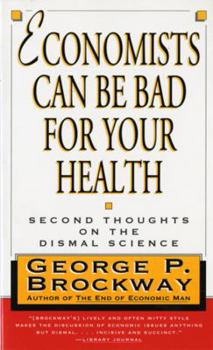Economists Can Be Bad for Your Health: Second Thoughts on the Dismal Science
Select Format
Select Condition 
Book Overview
George P. Brockway's clear, down-to-earth explanations show us how economics works and what the important issues are.
Format:Paperback
Language:English
ISBN:0393315061
ISBN13:9780393315066
Release Date:October 1996
Publisher:W. W. Norton & Company
Length:162 Pages
Weight:0.33 lbs.
Dimensions:0.4" x 5.0" x 8.3"
Related Subjects
Business Business & Investing Economics Education & Reference Popular Economics ReferenceCustomer Reviews
1 rating
Old economics complaints, but short and apt
Published by Thriftbooks.com User , 21 years ago
I am not familiar with "The New Leader," in which each article in this book originally appeared as a column "The Dismal Science." Readers are assumed to be bright enough to hope for a society in which people can find jobs, make enough money to pay their bills, and be puzzled when they notice a few items repeated endlessly in "The New York Times" about things which the Federal Reserve expected to climb when something else goes down, but which had exhibited a history of climbing as nothing but money in a modern economy could ever expect to grow, in spite of efforts to watch the amount of money more closely than anything else. Texts in this book do not appear in chronological order, with "Trickle-Down Greed" from January 1982 showing up on page 109, when the ideas of the rich, it can finally be admitted, "have gone a long way toward destroying the morale of the American people." If I really wanted a job, I might be much less willing to agree so wholeheartedly, as such political wishful thinking is becoming a major obstacle to intellectual forms of slavery for a living wage.This book is a collection of articles from exciting (volatile) times, some when interest rates were high because of inflation, when it was easy to do a few calculations and show that the extra amount of interest being paid yearly on all debt "costs close to three times as much as the federal deficit the bankers moan about." With lower interest rates, "we'd be running a surplus, not a deficit." (p. 36). In a perfect world, with a lower interest rate, we "would quickly and powerfully stimulate investment in productive enterprise, with a consequent growth in employment. It would trigger a one-time surge in the stock and bond markets, followed by a gradual tapering off of speculation." (pp. 36-37). Obviously right about the December 1988-January 1989 circumstances in which that projection was made, readers now can only wonder how stupid a vast speculative bubble based on the belief in a total change in the nature of the economy in the 1990s could seem in 2003, when the federal deficit grows at a time of incredibly low interest rates. None of our problems are Brockway's fault, though he is still right about "The number of people living in poverty is growing, and within that group the number of those who work full time yet are poverty stricken is growing faster still." (p. 37).Brockway was trying to look this far ahead. "Well into the twenty-first century, for instance, we will be paying up to 15.75 percent interest on a trillion dollars' worth of Treasury bonds sold in the wonder-working days of former Federal Reserve Chairman Paul A. Volcker." (pp. 38-39). This could have been part of a plan, and however stupid our current situation seems, one explanation could be that someone would like to produce a financial disaster so big that it will forever destroy the expectations of millions of people who could easily be deprived of everything by those who have the power to do so






